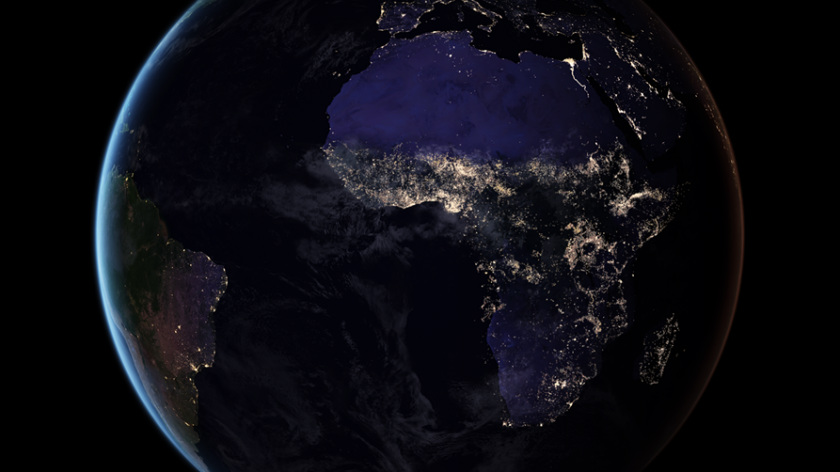
Composite picture of a night sky over the African continent in 2030 based on the World Energy Outlook model of affordable, reliable, sustainable and modern energy for all (the International Energy Agency).
Accessible, reliable and affordable energy is the cornerstone of transformational socio-economic development. For Africa, delivering sustainable development is dependent on meeting the continent’s energy needs in order to lift populations out of poverty, catalyze industrialization, and stimulate economic growth.
Despite the continent’s abundant energy resources, energy poverty is still rife in the continent with close to 600 million people lacking access to electricity. This sets nations back on meeting energy access goals, retards industry progress, and diminishes the continent’s economic growth by 2 to 4 percent every year.
On a positive note, energy access has improved in recent years with the number of people without access in sub-Saharan Africa falling for the first time in absolute terms, and with countries such as Ethiopia, Kenya and Rwanda leading the pace. Africa is at the forefront of distributed energy systems that can increase energy access in rural areas faster, more cheaply, and more widely than conventional grid extension, driven by innovative business models and rapidly decreasing technology costs. At the same time, renewables are on the rise across the continent with significant renewable generation capacities added in countries such as Egypt, Morocco and South Africa.
Renewable energy investments are also on the rise across the continent from Senegal, to Kenya, and Zambia. While this progress is encouraging, the pace of energy access falls far short of meeting the universal energy access target by 2030.
Closing the gap on Africa’s energy challenges presents major opportunities for investors keen on engaging with the continent, especially on helping Africa meet the shortfall in the estimated $90 billion required to achieve universal energy access by 2030.
Clearly, these financing needs are of such magnitude that no single institution is capable of meeting them in isolation. This is why development finance institutions need a pragmatic shift in how they do business and leverage scarce public resources in order to mobilize private sector financing at scale, “from billions to trillions.”
The African Development Bank is leading by example. For instance, the Bank launched the Facility for Energy Inclusion to close funding gaps in the small-scale energy infrastructure sector and catalyze last-mile energy access. Through a mix of commercial and concessional instruments, the facility provides low cost of capital, and mitigates key credit and currency risks. Additionally, the recently approved Room2Run transaction allows the Bank to effectively transfer the credit risks of selected loan portfolios to investors, which lowers the total risk consumption of the Bank.
This initiative will enable the Bank to recycle capital efficiently in order to boost lending capacity and enhance private sector investments. The transaction has already attracted major support from partners like the European Commission which will provide a $100 million guarantee to be channeled into renewable energy projects in Africa. Ultimately, this will free up around $700 million, which can be re-allocated to new projects.
Multiple barriers hinder investments and private sector participation which could potentially fast-track energy access. These include the lack of an enabling policy environment for investors and other systemic bottlenecks that slow down transactions and escalate project costs. Transforming the energy landscape calls for a multi-faceted approach to unlock private sector capital by resolving these barriers in order to create the ideal conditions for investments in the continent.
The African Development Bank in close collaboration with other development partners is perched on the apex of creating a vibrant marketplace that will deliver the energy transformation necessary to move Africa forward. The Bank is dedicated to eliminating and minimizing barriers for investors, primarily through financial instruments to de-risk transactions, disseminating knowledge and market data, and facilitating peer-to peer learning and networking. Private sector engagement is on the rise, buoyed by various partnerships such as the New Deal on Energy for Africa and the US-led Power Africa Initiative.
To sustain this momentum, the Bank convened the inaugural Africa Energy Market Place (AEMP) in Abidjan in July 2018. The AEMP is a platform for public private dialogue and is set up to address barriers to mobilizing and scaling-up private investment into the energy sector. Effectively, AEMP reviews and prioritizes transformative energy transactions, and accelerates reforms in order to attract private investments and create a pipeline of bankable projects. Five countries participated in the inaugural edition: Côte d’Ivoire, Egypt, Ethiopia, Nigeria, and Zambia.
The conversations that began at the AEMP are set to continue in November’s Africa Investment Forum (AIF) in South Africa. The Forum convenes project sponsors, borrowers, lenders and investors with a shared interest in closing Africa’s infrastructure gap which is estimated to be anywhere between $130–170 billion per year.
By convening and facilitating mutually beneficial dialogue amongst stakeholders who can dramatically impact Africa’s energy landscape, the Bank is creating the requisite foundation for accelerated private sector investments in Africa’s energy sector in order to achieve universal energy access.
Indisputably, this will put the continent steadily on the path to socio-economic growth and sustainable development.
By: Amadou Hott, the Vice-President of Power, Energy, Climate Change & Green Growth at the African Development Bank